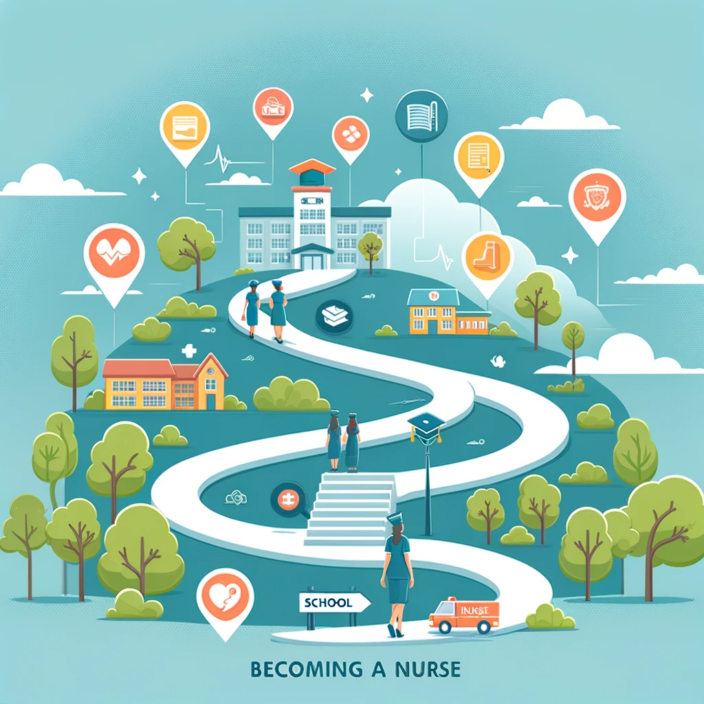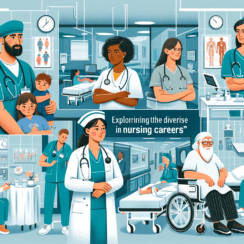How to Become a Nurse: A Comprehensive Guide

Introduction
Nursing is a profession that embodies compassion, care, and dedication, playing a critical role in the healthcare system. Nurses are the frontline heroes in patient care, offering a blend of clinical expertise and emotional support. This article provides an insightful guide on how to embark on this noble and rewarding career path, detailing the steps necessary to become a nurse. The journey to becoming a nurse involves several key steps: from understanding the role and responsibilities of a nurse, to completing the required educational programs, obtaining licensure, and finally, stepping into the professional world of healthcare. Each step is crucial in preparing aspiring individuals for a successful and fulfilling career in nursing. Whether you are a high school student considering your future career options, or someone looking to change professions, this guide will offer valuable information on how to achieve your goal of becoming a nurse. We will explore the educational paths, practical experience, licensure requirements, and continuous learning opportunities that form the cornerstone of a nursing career.Understanding the Role of a Nurse
The role of a nurse is multifaceted, extending far beyond basic patient care. Nurses are integral to the healthcare system, providing essential services that range from clinical care to emotional support for patients and their families. This section explores the diverse roles of nurses and the vital impact they have in healthcare settings. What Nurses Do: Nurses perform a wide array of duties including administering medication, monitoring patient health, conducting medical procedures, and providing emotional support. They are often the primary point of contact for patients, acting as a liaison between them and the doctors. Nurses also play a key role in patient education, helping individuals and families understand health conditions and treatment plans. Different Types of Nurses: The nursing profession encompasses various roles, each with its own scope and responsibilities. Registered Nurses (RNs) provide general nursing care and are the most common type of nurse. Licensed Practical Nurses (LPNs) or Licensed Vocational Nurses (LVNs) offer basic nursing care under the supervision of RNs. Advanced Practice Registered Nurses (APRNs), including Nurse Practitioners, Nurse Midwives, and Nurse Anesthetists, have additional training and can perform more complex procedures and even prescribe medication. Significance in Healthcare: Nurses are the backbone of healthcare services. They are critical in ensuring continuous patient care, maintaining healthcare quality, and improving patient outcomes. Their empathetic approach and clinical expertise make them invaluable in both acute and long-term care settings. Nurses often serve as patient advocates, ensuring that each individual receives the best possible care tailored to their needs. Understanding the varied and crucial roles of nurses is the first step for anyone considering this career. Nurses are more than just healthcare providers; they are educators, advocates, and key players in the journey towards patient recovery and health maintenance.Educational Requirements
Becoming a nurse requires specific educational qualifications that lay the foundation for this challenging yet rewarding career. This section outlines the various educational pathways available for aspiring nurses, highlighting the prerequisites and key components of each program. High School Preparation: The journey to becoming a nurse often begins in high school. Prospective nursing students should focus on subjects such as biology, chemistry, physics, and mathematics. Volunteering in healthcare settings can also provide valuable experience and insight into the nursing profession. Additionally, developing strong communication and interpersonal skills during this stage can be beneficial for future nursing roles. Nursing Programs: To become a Registered Nurse (RN), candidates must complete an accredited nursing program. There are several types of programs to choose from:- Associate Degree in Nursing (ADN): A two-year program that provides the basic knowledge and skills required to become an RN.
- Bachelor of Science in Nursing (BSN): A four-year degree that offers a more comprehensive education, including leadership and research, in addition to clinical skills.
Choosing the Right Nursing Program
Selecting the right nursing program is a crucial decision for aspiring nurses. The choice of program can significantly impact your education quality, career trajectory, and readiness for the nursing profession. This section provides guidance on factors to consider when choosing a nursing program, ensuring that you select a path that aligns with your career aspirations and learning style. Accreditation: The most critical factor in choosing a nursing program is its accreditation. Accredited programs meet the standards set by relevant nursing educational bodies, ensuring the quality and credibility of the education provided. Graduating from an accredited program is often a prerequisite for licensure exams and further professional advancement. Program Curriculum: Evaluate the curriculum of potential nursing programs to ensure they cover essential topics and provide comprehensive training. The curriculum should include a mix of theoretical knowledge and practical skills, preparing students for the diverse challenges of the nursing field. Clinical Experience: Hands-on clinical experience is a vital part of nursing education. Look for programs that offer robust clinical rotations in various healthcare settings, as this experience is crucial for developing practical nursing skills and understanding different patient care environments. Online vs. Traditional Programs: Consider the mode of education that best suits your learning style and life circumstances. Traditional, on-campus programs offer face-to-face interactions and a structured learning environment. Online programs provide flexibility and are often suited for those balancing education with work or family commitments. However, even online programs typically require some in-person clinical training. Location and Cost: The location of the nursing school and the cost of the program are also important considerations. Factor in the cost of tuition, living expenses, and potential travel for clinical rotations. Additionally, consider whether you prefer to study in a rural or urban setting, as this can influence the type of clinical experiences available to you. Future Career Goals: Align your program choice with your long-term career goals. If you have a specific nursing specialty or career path in mind, look for programs that offer relevant courses, specializations, or partnership opportunities with healthcare facilities in that field. Making an informed decision about your nursing education is a step towards a successful and fulfilling nursing career. Consider these factors carefully to choose a program that not only meets educational standards but also aligns with your personal and professional aspirations.Gaining Practical Experience
The journey to becoming a nurse involves much more than classroom learning. Practical experience is a cornerstone of nursing education, providing students with the hands-on skills and real-world exposure essential for professional competence. This section discusses the various avenues through which nursing students can gain the practical experience needed to excel in their future careers. Clinical Rotations: Clinical rotations are a mandatory part of nursing programs, allowing students to apply their theoretical knowledge in real healthcare settings. These rotations cover different areas of nursing, such as pediatrics, geriatrics, emergency care, and surgery, offering a well-rounded view of the nursing profession. Under the supervision of experienced nurses and educators, students learn to perform various nursing duties, interact with patients, and become part of a healthcare team. Internships and Externships: Beyond clinical rotations, nursing students can further enhance their experience through internships or externships. These opportunities provide deeper immersion in specific areas of interest or specialty. Internships and externships are invaluable for building a professional network, understanding the day-to-day responsibilities of a nurse, and gaining confidence in clinical skills. The Value of Real-World Experience: Practical experience is crucial in developing critical thinking, decision-making, and patient communication skills. It helps students transition from theory to practice and understand the complexities of patient care. This experience is not only vital for passing licensure exams but also for entering the workforce as a competent, confident nurse. Volunteering and Part-Time Work: Volunteering in healthcare settings or working part-time in medical facilities can also provide valuable experience. These activities offer additional exposure to the healthcare environment and help students develop a deeper understanding of the nursing role and patient care dynamics. Securing a range of practical experiences during nursing education is pivotal. It not only enhances learning but also prepares students for the realities of the nursing profession, equipping them with the skills and confidence needed to provide high-quality patient care.Licensure and Certification
Becoming a licensed nurse is an essential step in the journey towards a nursing career. This section covers the process of obtaining licensure and additional certifications, which are critical for practicing nursing professionally and advancing in the field. NCLEX-RN and Licensure Exams: After completing a nursing program, graduates must pass the National Council Licensure Examination (NCLEX-RN) to become a Registered Nurse. This exam tests the knowledge, skills, and abilities essential for safe and effective nursing practice. Preparing for the NCLEX-RN involves thorough study and understanding of nursing concepts, clinical practices, and patient care guidelines. State Licensure Requirements: Each state has its own requirements for nursing licensure. While passing the NCLEX-RN is a universal requirement, additional criteria can include background checks, continuing education, and specific documentation. It’s important for aspiring nurses to familiarize themselves with the licensure requirements of the state where they intend to practice. Additional Certifications: Beyond initial licensure, nurses can pursue specialized certifications to enhance their skills and career prospects. These certifications, offered by various nursing organizations, cover specialties like pediatrics, gerontology, critical care, and more. Obtaining such certifications often requires additional education, clinical experience in the specialty area, and passing a certification exam. Importance of Certification: Specialty certifications demonstrate a nurse's commitment to excellence and expertise in a specific area of nursing. They can lead to better job opportunities, higher salaries, and recognition as an expert in the field. For nurses looking to advance their careers, these certifications are invaluable assets. Obtaining licensure and pursuing specialized certifications are crucial steps in a nurse's professional development. They not only validate the nurse's capabilities but also open doors to diverse opportunities within the healthcare sector.Starting Your Nursing Career
After completing educational requirements and obtaining licensure, the next step is to embark on your professional nursing journey. This section offers guidance on finding your first nursing job, preparing a strong resume, and making a successful transition from nursing student to professional. Finding Your First Nursing Job: Begin your job search by identifying the type of nursing role and healthcare setting that aligns with your interests and qualifications. Utilize online job portals, nursing career fairs, and professional networks to find job opportunities. Consider applying to various settings, such as hospitals, clinics, long-term care facilities, and community health centers, to broaden your prospects. Resume Building: Create a comprehensive resume that highlights your nursing education, clinical experiences, internships, and any relevant certifications. Emphasize skills such as patient care, communication, teamwork, and any specialized training. Tailor your resume for each job application to reflect the specific requirements of the role. Job Interviews: Prepare for job interviews by researching potential employers, reviewing common nursing interview questions, and practicing your responses. Be ready to discuss your clinical experiences, how you handle challenging situations, and your motivation for choosing nursing as a career. Transitioning to Professional Nursing: Transitioning from a student to a professional nurse can be challenging. Seek mentorship opportunities, be open to learning, and embrace continuous professional development. Understand that it's normal to feel overwhelmed initially, but with experience, you will gain confidence and proficiency in your role. Starting your nursing career is an exciting step that marks the beginning of a rewarding professional journey. With the right preparation, a positive attitude, and a commitment to ongoing learning, you can establish a successful and fulfilling career in nursing.Continuing Education and Career Advancement
A career in nursing is not static but one of continuous growth and development. This section emphasizes the importance of ongoing education and explores the various pathways for career advancement in the nursing field. Lifelong Learning in Nursing: The healthcare field is constantly evolving, making lifelong learning essential for nurses. Continuing education helps nurses stay current with the latest medical practices, technologies, and healthcare trends. Many states require nurses to complete a certain number of continuing education units (CEUs) to maintain their licensure. Advanced Degrees: Pursuing advanced degrees such as a Master of Science in Nursing (MSN) or a Doctor of Nursing Practice (DNP) can open doors to higher-level positions. These degrees allow nurses to specialize in areas like nurse practitioner roles, clinical leadership, or nurse education, and often lead to increased responsibility and higher salaries. Professional Development Opportunities: Attending workshops, conferences, and seminars is a great way for nurses to expand their knowledge and skills. Networking with other healthcare professionals during these events can also provide valuable career insights and opportunities. Career Advancement Paths: Nursing offers a variety of career advancement paths. Nurses can move into management and administrative roles, become nurse educators, or specialize in areas such as informatics, research, or public health. Each path offers unique challenges and opportunities to make a significant impact in healthcare. The field of nursing provides endless opportunities for growth and advancement. By embracing continuous education and seeking out professional development opportunities, nurses can advance their careers, enhance their skills, and continue to make meaningful contributions to patient care and the healthcare system.Conclusion
Embarking on a career in nursing is a journey filled with opportunities for growth, learning, and making a significant impact in the lives of patients. This article has outlined the key steps to becoming a nurse, from understanding the role and obtaining the necessary education, to gaining practical experience, licensure, and looking towards career advancement. Becoming a nurse requires dedication, compassion, and a commitment to continuous learning. It is a profession that not only offers a stable and rewarding career path but also the opportunity to make a real difference in healthcare and patient outcomes. Nurses are the heart of healthcare, providing essential care and support to patients across a variety of settings. For those aspiring to join the nursing profession, the journey may be challenging, but it is also incredibly rewarding. The field of nursing offers diverse pathways and specializations, allowing nurses to find their niche and excel in areas they are passionate about. The impact that nurses have on individual lives and the broader healthcare system is immeasurable and truly fulfilling. In conclusion, nursing is a noble and vital profession, offering a blend of personal satisfaction and professional achievement. As you embark on this career path, embrace the challenges and opportunities that come with it, and take pride in knowing that you are joining a community of professionals dedicated to making a difference in the world.
Previous Post
Next Post



